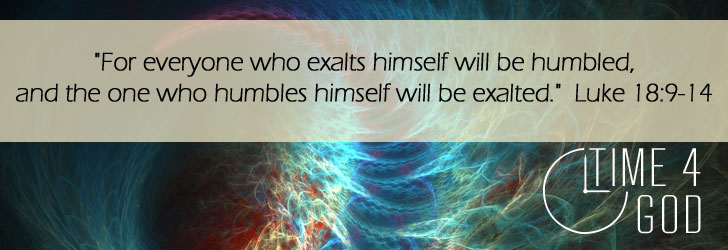The One Who Humbles Himself Will Be Exalted
The question we Christians are challenged to ask ourselves during this time of Lent is one of the most difficult of questions. It seems, at the outset, to be a very simple question, with seemingly simple answers, but it is not.

The question we Christians are challenged to ask ourselves during this time of Lent is one of the most difficult of questions. It seems, at the outset, to be a very simple question, with seemingly simple answers, but it is not. The question is, ʺWho am I?ʺ Understanding who we truly are within ourselves and before God is an essential element in a life of faith. ʺWho am I, really, before God?ʺ
We can begin to answer that question with things like, ʺI am a father, or a mother, a husband, a wife,ʺ and so on. Or we might begin with what we do, as if that was our identity. Some of us might even begin with, ʺI am a Christian.ʺ But with these answers we are only naming the surface things. We are being asked to go further inward when we are asked this question, to get at the very heart of who we are most profoundly as individuals. Some of us may have a distorted sense of who we are in the world, perceiving ourselves either with an exalted sense of our own importance in the world, or we might suffer from a sense of our imagined unimportance. When we answer that question in this manner, we are doing so with our eyes on the world, not on God.
John Henry Newman once answered this question in this way: ʺOur deepest identity is rooted where we are like other people—weak, broken, sinful, but sons and daughters of God.ʺ This is a powerful thought. It recognizes something that every Christian ought to know and believe. It recognizes that we are all children of God, that all of us are alike, equal in our divinely created souls. God does not love one of his children more than another. It recognizes that we are all sinners, that we are all weak and broken, but that God’s love for us is so great that he entered into our humanity to show us his love for us, even to the point of dying for us—each and every one of us.
[content-ad]
In Luke 18:9-14 we see how the Pharisee and the tax collector understand this question very clearly. The Pharisee, ʺtook up his position and spoke this prayer to himself, ‘O God, I thank you that I am not like the rest of humanity—greedy, dishonest, adulterous—or even like this tax collector. I fast twice a week, and I pay tithes on my whole income.ʺ Then Jesus tells us of the internal thoughts of the tax collector who, ʺstood off at a distance and would not even raise his eyes to heaven but beat his breast and prayed, ‘O God, be merciful to me a sinner.ʺ Here Jesus wants us to ask ourselves: Which of these two men really understands who he ‘really’ is before God? Indeed he is telling us this because he wants us to stand in his presence and answer that question of ourselves.
Pope Francis was asked by a reporter. ʺWho is Jorge Mario Bergoglio?ʺ The new Pope responded, ʺI do not know what might be the most fitting description…I am a sinner. This is the most accurate description. It is not a figure of speech, a literary genre. I am a sinner whom the Lord has looked upon.ʺ This is an example of the humility of the tax collector. The Pope here understands who he is before God, that he is no different than the rest of us. He does not exalt himself because of his position, but rather recognizes who he really is before God.
Luke tells us then, ʺI tell you the latter (the tax collector) went home justified, not the former (the Pharisee); for everyone who exalts himself will be humbled, and the one who humbles himself will be exalted.ʺ (Luke 18:14)
Let us make our Lenten prayer then be, ʺO God, be merciful to me a sinner.ʺ In recognizing who we really are before God, we learn the humility of the tax collector, and we see our brotherhood and sisterhood with all others. In this way we can become more like Christ, in that we will, finally, ʺseeʺ the reason for why we should love others as he did. We will be more able to become merciful, as he is. We will understand his commandment to us to love and serve one another as he loved and served us.
SKM: below-content placeholderWhizzco for FHB

